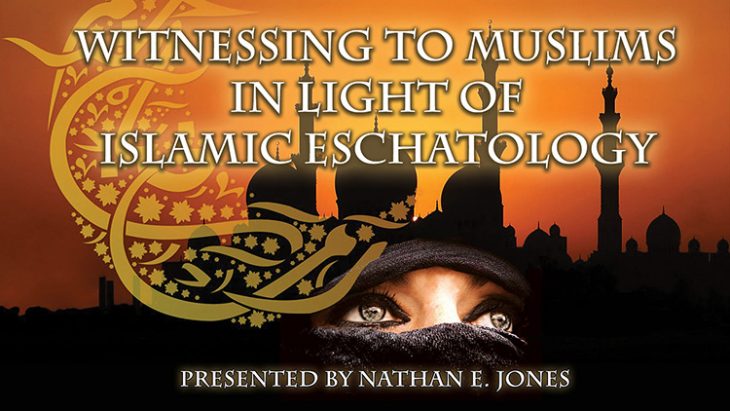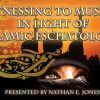In Part 1, we began to get a handle on the history of Islam and its founder. Now we will explore what the Muslim believes by looking at his holy books. Let’s continue this academic presentation by evangelist Nathan Jones!
Video Presentation
The Koran
The Christian evangelist should have some understanding of Islam’s holy books. The first and primary is the Qurʾan, or as transliterated into English, the Koran.10 The Koran is to the Muslim what the Bible is to the Christian. Koran means recitation.
Mohammad was illiterate, meaning he could not read or write. So, what he did was while he convulsed in trance-like states — possessions — he would perform automatic writing on bones and strips of linen and anything else he could find lying around. Scribes would surround Mohammad while he lashed about in these fits and recorded what he said. Mohammad also taught excerpts from the teachings of Moses, Jesus, and Zoroaster who was a Persian religious pedagogue. These teachings, along with his own fitful recitations over the years, formed the Koran. Its length became about as long as the New Testament.
Many different collections of these recitations existed before a book was finally compiled into one authoritative version in the Arabic language — the language of Allah. Because Arabic is considered Allah’s heavenly language, as Allah supposedly wrote the Koran on a table-sized stone tablet in heaven before passing his teachings on to Mohammad, Muslims believe no mortal man should translate the Koran into anything other than the pure Arabic (Sura 12:2; 13:37; 41:41, 44).11
Historical errors are resplendent throughout the Koran, though.12 For instance, it says that Jesus was born of Mary, the sister of Moses. The Koran also claims that Jesus did not die on the cross, rather Judas Iscariot replaced Jesus. The Koran also claims that Jesus is not the Son of God, and to claim otherwise is considered blasphemy. The Koran also claims the Samaritans tricked the Israelites at the Exodus, even though as a people group the Samaritans did not exist until hundreds of years after the Exodus during the Exile. Mohammad also claimed that Alexander the Great was a Muslim, even though Alexander had lived 900 years before Mohammad founded his religion.
Mohammad made some other very interesting teachings concerning women for, despite 15 wives, he often found women offensive. He taught in the Hadith that women are deficient in mind, (Sura 2:541; 3:826), that a majority of the people in Hell will be women, (Sura:1:28, 3:01, 2:161, 7:124), and that women are a bad omen.
The Hadith
The second Islamic holy book is called the Hadith, which means the report. Al-Bukhari’s authoritative version is a compilation of 7,000 genuine traditional sayings of what Mohammad supposedly once said — supposedly — because the book was compiled some 200 years after Mohammad had died.13
The Hadith helps people act just like Mohammad. So, if a Muslim wants to know what Mohammad believed or thought, they go to the Hadith. Christians live by “What would Jesus do?” Muslims through the Hadith live by “What would Mohammad do?”
Muslims can look to the Hadith to know exactly what Mohammad would have done. So, for example, if Mohammad needed money, then go raid a caravan as he did. If one needed to lie to advance their cause, well that would be okay, for that was what Mohammad did. If one desired to take more than one wife, well Mohammad limited men to only have four wives, even though he had amassed many more.
Mohammad also prescribed medical advice in the Hadith.14 Drinking camel urine will make one healthy. (Sura 7:590) A fly in one’s drink can cure disease. (Sura 4:537) Mohammad claimed that fever comes from the heat of Hell itself. (Sura 7:619) And, if you speak badly about a deceased person, that person will go to Hell (Sura 2:448).
Islam’s God
Remember that Mohammad was supposedly told by the angel Gabriel that his family god — Allah the moon god — was the one true God and that all people should worship him alone. Understanding this point is vitally important to the evangelist, for so many people today, especially in the Media, are erroneously claiming that Islam and Christianity worship the same God. It is simple to conclude that Jehovah God of the Bible is not at all Islam’s Allah when their characteristics are placed beside each other.
Allah is described in unitarian-monotheistic terms, meaning he is only one being. Allah is not a trinity consisting of the Father, Son, and Holy Spirit, as is Jehovah. To even say that Allah is trinitarian to a Muslim is called shirk, a term which means idolatry.
Allah to the Muslim is distant and unknowable. He is unpredictable concerning salvation, and he does not assure salvation. He reveals his will, but never himself. The relationship between Allah and a Muslim is master and slave, not father and son. Allah determines all, so no free will exists in his religion. He created both good and evil. He is feared by his followers, and he has no love for his own people.
It could be concluded based on the Koran’s description of Allah that he has far less of the characteristics of the God of the Bible and more a likeness to the biblical character of Satan. So, should anyone claim that Mohammad was equating the God of the Bible to the Allah of Islam is not speaking the truth. Jehovah and Allah are totally different entities. As missionary-evangelist Lester Sumrall compares:
Muslims worship one god and we, Christians, worship one God, but there all similarity ends. Mohammed’s god is radically different from God as He is revealed to us in the Bible. Mohammed’s god is a spiteful, selfish autocrat who must be placated with a monotonous routine of holy motions. The God we worship is a loving, compassionate Father who asks only that we love Him in return and obey Him, John 14:15.15
Islam’s Doctrines
The Islamic belief system consists of five main areas of doctrine. The first concerning Allah has already been addressed.
The second doctrinal error involves angels. Islam teaches that there is a hierarchy of angels. Each person is assigned two angels. One records all of the good deeds one does and the other records all of the bad deeds.
The third area of doctrine involves Islam’s holy books — the Koran and the Hadith — which also has already been addressed. Though, Islam does also consider the Torah of Moses, the Psalms of David, and the Gospel of Jesus, along with the Koran, as all holy books. Of course, Islam teaches that the Koran supersedes all other holy books.
The fourth area of doctrine involves the prophets. While the Koran mentions 28 specific prophets of Allah, Islam identifies well over a hundred thousand prophets.16 The list even includes Adam, Noah, and Jesus, though Muslims consider Mohammad the greatest of them all.
The fifth area of doctrine concerns the belief in a future judgment, which will be addressed shortly.
Islam’s Pillars
For Muslims to work towards attaining entry into Paradise, they must follow what is called the Five Pillars of Islam.
The first pillar is called the Creed, or the Shahadah, which means to bear witness. The following creed is what a person must say in order to become a Muslim: There is no God but Allah, and Mohammad is his prophet. This is the Islamic version of the Christian believer’s prayer.
The second pillar involves prayers, called the Salat. A Muslim will pray five times a day: dawn, noon, afternoon, evening, and nighttime. And they will always pray kneeling face down and towards Mecca.
The third pillar involves giving alms to the poor, which is called Zakat. One-twentieth of a Muslim’s income goes to benefit orphans and widows and for building mosques.
The fourth pillar involves fasting, called the Sawm. Sawm came from Islam’s pre-cursor religion, Sabianism, which worshiped the moon and other heavenly bodies by fasting.17 During Ramadan, which is the ninth month of their lunar year, Muslims will abstain from all food and drink and sex during the daylight hours, but when night falls, they can indulge in whatever they wish.
The fifth pillar is called The Pilgrimage, or the Hajj. Every Muslim must travel at least once during their life to Mecca to walk around the Kaaba Stone. And should a Muslim be too infirmed, he can send a representative to take his place. Muslims must make a pilgrimage to Mecca in order to attain entry into Paradise.
Many Muslims, especially the Kharijite sect, would also argue that there is an unspoken sixth pillar, which is called Jihad, meaning “the struggle” or “to strive.”18 Allah wills that the Muslim take up the armed struggle for Islam against what they call the infidels and apostates, meaning the unbelievers (Sura 2:186-190).
In the third part of this series on Islamic eschatology, we’ll look at history and be amazed at how fast Islam has spread across the world.
End Notes
10. Qur’an, http://quran.com.
11. Robert Morey, The Islamic Invasion (Eugene, OR: Harvest House Publishers, 1992), 117.
12. Walker, 108.
13. Muhammad Al-Bukhari, Sahih al-Bukhari Hadith Collection. (Sunna.com, 870).
14. Richard Booker, Radical Islam’s War Against Israel, Christianity, and the West (Shippensburg, PA: Destiny Image Publishers, Inc., 2008), 36.
15. G.J.O. Moshay, Who Is this Allah (Bucks, UK: Dorchester House Publications, 1995), 155.
16. Booker, 34.
17. Carlson and Decker, 108.
18. Philip K. Hitti, History of the Arabs, (tenth ed.) (New York, NY: St. Martin’s Press, 1970), 133.







